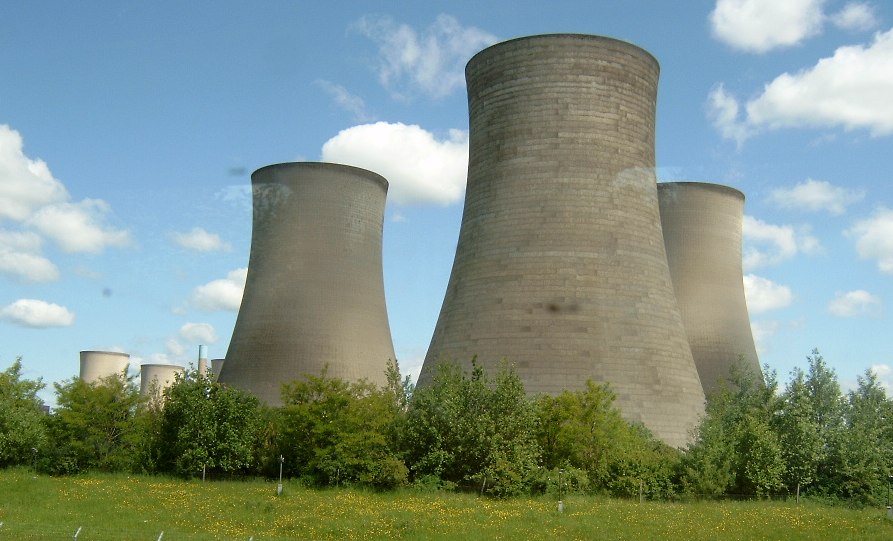Nuclear energy is a very misunderstood topic. Issues include the risk of meltdowns, radiation, and how to store nuclear waste. Why do some people think that nuclear power is clean, considering all the waste?
Because the numbers are very clear. “All the waste” from nuclear is still much less wasteful than burning fossil fuels. Here’s why:
We burn A LOT of fossil fuels
All this coal? If we burn it, it’s all going to be turned into waste. ALL OF IT. When the coal burns up, the waste need to go somewhere. And most of that waste releases into the atmosphere.
And it’s not just carbon dioxide which contributes to global climate changes. Sulfur. Lead. Mercury. Cadmium. Radon. These are all dangerous compounds.
Fossil fuels are messy things. But it has worked for a few hundred years. Still, nuclear works even better.
Nuclear energy is extremely concentrated
The energy stored in these nuclear fuel pellets (which contains about 3 grams of uranium) equals about 3,000 kilograms of coal. These three pellets supply the energy needs of an American house for about 7 months.

Compared to coal, this reduces “all the waste” by 99.9999%.. Rather than putting that waste into the atmosphere which can affect the climate, it remains a solid. Advanced nuclear reactors can actually reuse much of the waste as more nuclear fuel. We could even get rid of nuclear waste by reusing it as more fuel!
“But what about the RADIATION?!?”
Yes, people are very scared of radiation. But they often misunderstand it.
This banana is radioactive. True story. Eat bananas for their potassium? Well, some of that potassium is radioactive. Which means every banana you eat is radioactive!
Radiation is not magical death cooties
But don’t worry about eating bananas. See, radioactivity is not just (ahem) magical death cooties. Scientists have study radiation extensively for over 100 years.
We’re swimming in radiation all the time. Light itself—the stuff hitting your eyeballs—is radiation. Fortunately, we can block a lot of radiation easily. Ever held your hand over a flashlight?
Tada, you’re blocking radiation!
But there’s a specific kind of radiation that’s particularly harmful to living things: ionizing radiation, and often more specifically gamma radiation.
And yeah, that banana emits this harmful kind of gamma radiation. But not very much of it at all.
Because a whole lot of things emit radiation. For example, carbon makes up most of your body. Well, some of that carbon is radioactive too. Your body itself releases radiation.
Now, some people worry about the radioactivity too much. That makes sense because that’s exactly why we care about it: radioactivity means something is releasing energy. So we often think things like uranium must be incredibly dangerous.
But they’re not. If you go back up to the photo above, that person is holding three uranium fuel pellets in his hand. Outside of a nuclear reactor, this material can be handled safely.
But the thing is… well, radiation is all over the place. Mining and burning coal (or any other fossil fuel) releases—go way back above—radon.
Radon is extremely radioactive and toxic. So if you live in the U.S., you are already at risk to having radon exposure in your own home.
Radon exposure can cause health problems like lung cancer. Using fossil fuels releases a lot of radon. So, fossil fuels release a lot more radioactive material into the environment than nuclear fuel.
Harnessing nuclear power prevents wasted energy
It’s important to remember: nuclear fuels decay whether we use them or not. They exist in the Earth already. They will decay (eventually), whether we use them or not. Whether we dig them up, they become “natural waste” (eventually).
Finally, the question is more like: should we extract the energy that’s going to be released by nuclear decay anyway?
What to read next?




I think this is just part of a bigger problem where people see some scary word like “nuclear,” “chemical” or “synthetic” and emotionally decide that the thing in question is bad. It’s incredibly easy for lies like this to spread. I think it’s a good thing that you kept the article short, because many people do not take the time to verify whether something is true or false, because it takes too long.
After reading this article, still do not trust nuclear energy. What this article lacks is numbers. Sure radiation is a natural part of the environment at low levels that generally have a very minimum impact on biological life. Nuclear power plants produce unnatural waste that is radioactive to a point where it is highly toxic for thousands of years. I don’t think all the waste can be reused, some will have to be stored as it is currently being stored. Over time, and this means very very long periods of time waste containment corrodes and highly toxic leaks into the environment are inevitable. The cost and management of this material will fall to future generations long, long into the future. Bottom line: nobody wants a nuclear waste dump in their own back yard, far, far away, slightly better, best, none at all.
The invisible elephant in the room is advanced design nuclear power. AOC – even her! – says they are worth having a look at. So does Dr. James Hansen. People keep thinking about existing nuclear plants. But these are no more than scaled-up reactors from Admiral Rickover’s submarines of the 1950s. The new designs are smaller, use less fuel, and are much safer (even though the old ones were actually quite good). Some can even use the spent fuel now in storage as their own fuel. And a single nuclear plant on a few acres can supply power to a million people 24/7 with zero emissions. Only then will electric vehicles make sense. People are terrified of radioactivity. Yet it is vastly easier to contain than other hazards. Look at the facts here as well.